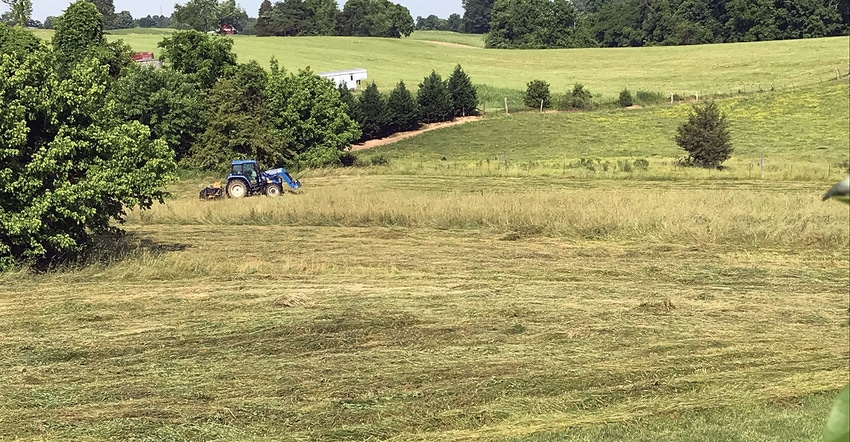
Agricultural land values were holding mostly steady at the beginning of 2020 as optimism over trade deals and some glimmers of hope for commodity prices buoyed spirits.
Then COVID-19 threw a wad of muck into the machinery and gummed up the works.
"The land auction market absolutely changed because of the pandemic," says Randy Dickhut, AFM, senior vice president, real estate operations for Farmers National Company, Omaha, Neb.
"As the industry finished the normal spring auction season, in late March and April, things changed," Dickhut says.
The process itself evolved to meet the challenges of social distancing and to assure buyer and seller health. "We had public auctions with folks staying in their pickups in parking lots," he says. "Auction aides moved around the area to mark bids. We had some phone auctions on conference call lines. Some switched to bid sales (Prospective buyers sent in bids by certain date.)."
Other land sales options included private treaty listings. "We adjusted on the fly. Mostly, things worked pretty well," he says.
Looking ahead
Some of those changes necessitated by circumstance may become part of corporate business models.
"We had been doing online sales before the shutdown," Dickhut explains. "We switched one or two that way during the shutdown. It was already in the tool kit. We may see a few more of those in the future.
"Sellers now are looking at restrictions easing and want to return to public auction. That's still the main way of selling land in most areas, not so much in the Delta but in the Midwest and the Plains states."
He says bid sales have worked fairly well. "We will see a little of everything." Iowa, for instance. is currently allowing public auctions "but with distancing," Dickhut, says.
Changing land values
He says changes in land values during the pandemic "vary by area. All real estate is local. Iowa was wrapping up the spring sales season and most of the better-quality land had sold. Lower quality farmland got softer and harder to sell."
He says Wisconsin was just beginning to see some positive movement early in the year. "The dairy industry was just starting to see a glimmer of hope and then got slammed again. Because of financial struggles, land values in Wisconsin are down 10%."
In other regions, good quality land is holding steady to little lower. "Recreation land is still up in the air."
Dickhut expresses caution about Delta land sales. "Land values might be slightly down, but it is too soon to tell. We did not have a lot of farmland trading hands anyway, and now it has slowed a little more. By fall and winter, we will have a better idea. A lot depends on what grains, other commodities and livestock markets are doing and how much cash the government distributes to producers."
Little movement
Dickhut says overall, across the Farmers National area, farmland values remain "fairly steady for good quality land but with some softening. We see some caution in the market for buyers and sellers. Not much land is moving."
It's not a crisis, he says. "People want an asset over time that offers long-term value. Land is more of a safe haven."
Landowners with property for sale, Dickhut says, should do some homework and know the market.
"We believe in boots on the ground. Get a broker or trusted advisor who knows the market, local values, what the market is willing to pay, and how much land is for sale in the area. The advisor also will know if buyers are aggressive."
Marketing savvy also comes into play. Consider whether the sale is likely to be to a neighbor, or if the property appeals to a national market or an investor. "Know who the buyers and sellers are."
He says the same holds for potential buyers.
"Do your due diligence. Evaluate the soil fertility and the condition of the irrigation system. How well is the system maintained? Consider water rights and availability.
"Know the market. Who are you competing with, other farmers or investors? Learn who is in the market."
It's an interesting time, Dickhut says. "The land market is now in a push and pull situation. What direction will it go next? Positive and negative supports are on the horizon." Which will have the most pull over next six months or so is a big question.
He says several factors affect how much land will be available. With an aging farm population, some could assume a lot of acreage will be up for sale. "But a lot of the time farmer retirees don't sell their land." Some prefer to rent or lease it for retirement income.
Others are more likely to sell. Ranchers, he says, see little value from leasing acreage. "Pasture lease rates are just not high enough to earn much income."
Farmland owners with no heirs are more likely to sell, too. Farmland succession with multiple generations, Dickhut says, becomes complex and selling off may be the best option.
Back to business
He says Farmers National is slowly returning to regular business. "We're starting to bring people back to the home office where we typically have 80 to 90 people. But a lot of our employees are farm managers and real estate agents who work out of home offices."
As the industry moves back to something resembling normal, Dickhut says it's too early to predict where the land market will go, but says farmland remains a valuable asset.
"Agricultural land will continue to be bought and sold. Land passing to the next generation is a constant that remains in play no matter what. Decisions made by inheritors of land, producers, lenders, legislators and investors will come together over the coming months to provide the answer to what’s next for land values.”
About the Author(s)
You May Also Like






